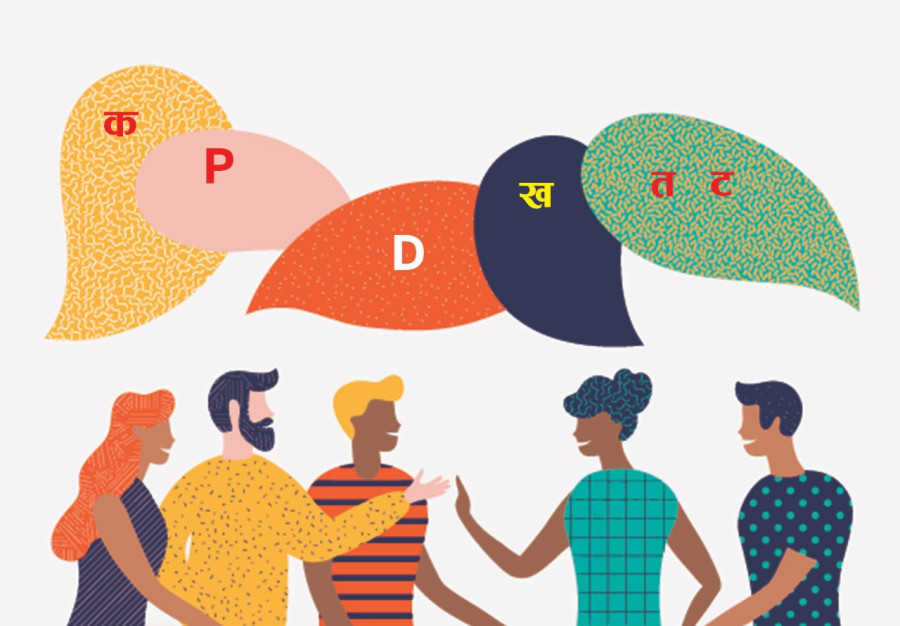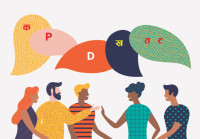As it is
Language policing and what we overlook
In a country that prides itself on its diversity of cultures, ethnicities, and a wide array of vernaculars, the discourse surrounding language gets particularly inflammatory.
Pasang Dorjee
Last week, some of my friends and I opened the audio-chat room on Twitter known as Spaces. These were people I had known only virtually; we shared an amicable relationship on the sole basis of our corny puns, memes, and some social discourses exchanged on Twitter. Our conversation was casual and lighthearted; we talked mostly about Tihar, sang some dohoris, and talked about myriad different mindless topics that perhaps only we cared about. All of us spoke in a mixture of Nepali and English, as we were comfortable doing so.
Conversing on Twitter Spaces can be an odd affair since anyone who follows the speakers or listeners on the social media platform can listen to the conversations. However, one needs to send a request to the room’s host to be able to speak on the platform. Fifteen minutes into our conversation, we were suddenly disrupted by someone whom the host had brought up randomly. In a rather hoarse voice, this man greeted us Namaste, wished us all a ‘Happy Tihar’, and we reciprocated his pleasantries. Not a second later, the atmosphere of the room took a turn, as this stranger started interrogating us in a contentious tone. He asked us why we weren’t speaking in ‘shuddha’ (fluent) Nepali, and immediately started cursing at us for incorporating English in our speech. After a plethora of vulgar Nepali words and slurs hurled at us, the host removed him from the room and blocked him so that he no longer had access to our space afterwards. I simply brushed off what had transpired as some irrelevant occurrence, but it was not the first time that had happened to me, or to many of my friends. The admonishment put us all off for a few minutes, and we tried digging into the absurdity behind the belligerent and patronising language policing we had just experienced. Dictating someone else’s speech in this context was not only uncalled for, but dismissive of countless different factors that people often overlook, or deliberately disregard when it comes to language—its socio-cultural and political implications.
In a country that prides itself on its diversity of cultures, ethnicities, and a wide array of vernaculars, the discourse surrounding language gets particularly inflammatory. I would like to preface this article by saying that I am not here to pitch a ‘solution’ to this entire argument whatsoever. I do, however, feel that it is necessary to push back on those who try to dictate how others should speak, so as to cater to their ears. The aforementioned incident on Twitter Spaces happened because we mixed English in our conversation, and I get it; we are from Nepal, so it is generally ‘expected’ that we speak in Nepali—but this sentiment is often rife with hypocrisy, jingoism, superiority complexes and becomes a double-edged sword if we try and unpack it, bit by bit.
Right from the get-go, the education system is wired predominantly in English, especially in Kathmandu where most of the resources are already centralised. Every single textbook that we can name, except for the Nepali subject itself, is written in English. As a consequence, it becomes only natural that the vocabulary of two different languages rubs off on students who grew up in that setting. Adapting to a ‘global’ language such as English, and excelling in it in a country where it is either someone’s second or third language, can also give people the edge that they want in their academics and career—especially if they are hoping to pursue it abroad. However, fluency in English can sometimes automatically be equated with intelligence, subconsciously or not, and that intrinsically becomes a problem. It's understandable, therefore, that people who didn’t have access to similar schooling would feel like they are either being excluded from certain conversations or that those speaking in English are deliberately attempting to ‘outsmart’ them and showcasing a sense of superiority complex; there is a degree of truth in that. The response to this, nonetheless, is equally gratuitous if we demand that people suddenly become ‘fluent’ in Nepali.
Language has immense power, as it unlocks different realities based on one’s relationship to a certain lexicon. Every language has a distinct way in which it moulds the values and belief structures of their respective demographic, depending on how nuanced it is. As I mentioned earlier, English is either someone’s second or third language in Nepal where more than a hundred other languages already exist. So if we are ‘preserving’ a language, and subsequently our identity, who gets to decide which one we should be defending if Nepali itself isn’t someone’s first language? Historically, Nepali had been a language that was spoken by the Khas people of the Karnali region and was known as khas-kura or khas bhasa. Although this is common knowledge, the discourse around language is just as replete with a sense of superiority among those whose first language is Nepali. Within the context of speaking in the Nepali language itself, there is derision, discrimination, and language policing against ethnic minorities who have had to learn Nepali as a second language.
Instances of the Madhesi population being mocked and even bullied in schools for carrying an accent, or loaning some Hindi words, while conversing in Nepali are also not uncommon. This is undoubtedly grounded in hill-nationalism and anti-Indian sentiment. Competence in the Nepali language often becomes a tool for some to showcase their superiority, impose cultural hegemony subtly or overtly—and a means to criticise and express their underlying bigotry. For some communities, their unique challenge in pronouncing certain alphabets in Nepali becomes a punchline for jokes cracked by so-called ‘fluent’ Nepali speakers. As a result, several ethnic families often encourage their children to speak in Nepali so that their own language does not interfere with their pronunciations, and that they are able to acclimate themselves well to their academic and social life. The aftermath of this entails most of these children losing touch with their first language—the language of their own ethnicity. I can attest to this myself since Sherpa bhasa is supposed to be my first language, but I am barely fluent in my mother tongue. I can neither blame my parents for not teaching me thoroughly enough—since they didn’t want that to become a barrier against learning both English and Nepali in school—nor does it seem prudent for me to be overly resentful towards those who speak Nepali as their first language.
I have had several elder relatives and family friends express their dissent over the Kathmandu-based younger generation of Sherpas not being able to understand their own first language. All we are left with is a tug-of-war between two identities we are expected to protect—while simultaneously having to read and write virtually everything in English—and if you prioritise one over the other, you’re either not Sherpa enough, or not Nepali enough. Even after trying to deflect discrimination, condescension or mockery, I myself cannot recall—growing up—the number of times I have had people point out how I would utter certain words in Nepali. Such is the case for countless other ethnic children who grew up hearing their parents speak in their own ethnic tongue as well as pronounce Nepali words in their own unique way. It certainly doesn’t help when those who have never had to contend with this dilemma bicker about other communities not adequately “Nepalising” themselves by adapting to a second language. And for those families that cultivate an environment conducive to learning their ethnic mother tongue, it can get particularly challenging to deal with paperwork and government issues in Nepal, or even hold a conversation in ‘proper’ Nepali. The lack of ethnic representation in government offices—where the documents are also written primarily in Nepali—stands a testament to how language can be a vital tool in influencing the political dynamics everywhere.
The whole discourse doesn’t have to be as incendiary as it usually is. Carrying a parochial attitude with regards to language is, I feel, inconsiderate, elitist and ignorant. Several factors contribute to how language is adopted by different groups and individuals, whether that's English mixed with Nepali, or Nepali and any other ethnic language. Imposing Nepali-language chauvinism onto those who have a different first language only contributes to more disharmony in a multiethnic and multilingual country such as ours. Patronising people to feel superior is truly akin to climbing a ladder that does not go anywhere. Thus, encouraging cultural sensitivity, unlearning stereotypes, and educating ourselves on ethnic issues and the indignity faced by marginalised communities in Nepal is how we can collectively bolster and create progress on the ‘diverse’ Nepal we are all so proud of.




 16.54°C Kathmandu
16.54°C Kathmandu








.jpg&w=300&height=200)

